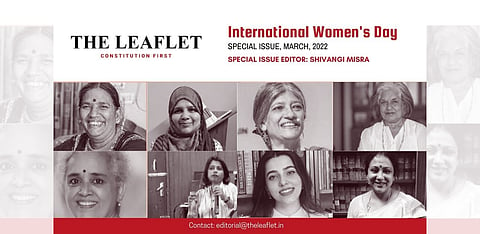

On the occasion of the International Women's Day, The Leaflet invites a cross-section of women writers during the week starting from today, to share their experiences with the uniqueness of the women's struggle to achieve equality and justice.
———-
NOT more than a year ago, India's health and social institutions collapsed under the weight of a global pandemic. We have surveys, data, shared lived-experiences, and reports confirming what many who work at the grassroots level knew to be true – that women are devastatingly and disproportionately impacted. In our special issue being launched on International Women's Day, the thematic articles will focus on how women are at the forefront – of the impact, of the 'essential' workforce, and of the various movements resisting their systemic oppression.
Development economist Jayati Ghosh, in her article elaborates on the many ways in which the women experienced substantial losses in income, were over-burdened at home, deeply suffered within paid and unpaid employment sector, and that among women, Dalits and Muslim workers were the worst affected. Lawyer Aaliya Waziri, in addressing the disproportionate impact on women, offers concrete structural recommendations that can support a post-COVID recovery, which is rooted in gender equality.
In the background of the social and economic crisis, the civil and political rights of women, especially access to justice for women in prisons, worsened. Trade-unionist and lawyer Sudha Bharadwaj, who spent the last three years as a political prisoner and a lifetime as a human rights activist, armed with the criminal manual, supported women in prison by providing them legal-aid that the State failed to. Bharadwaj, in her powerful article, takes us through the day-to-day struggle of being in prison where most women are waiting for a fair trial, and gives us urgent recommendations that are critical to a just legal system.
This women's day issue, I believe, is truly special, because we are not just faced with the difficulties but are also reminded by journalist Uzma Ausaf, that women led protests in our country became historic movements. Shaheen Bagh, the site where Muslim women showed us the power of collective action, stood at the forefront of change against the police and the powers that try to deny these women dignity. Academics Lakshmi Lingam and Ipsita Sapra talk to us about an experience that all women share – the nazariya, the way women can freely be versus the way women are 'supposed' to be. They critically analyse the media rhetoric that women must perform all roles – mothers and workers – with anything in between deemed 'less' in the eyes of people who are statistically working less and are treated better still. Senior advocate Mahalaxmi Pavani expertly tells us that that the law gives us the tool for transformative change but the law and the lawyers themselves require moulding and mentorship if we want to protect our constitutional morality.
Senior advocate Indira Jaising, in her article, takes us through the historical corridors of the "other side of the Independence movement" which is the freedom struggle for a just social order that women are still fighting for today. She walks us through some of the cases she argued in her fifty years of ceiling-breaking time in the courts, where every case was not a 'win' but it still served as a progressive ladder rooted in a political approach. In her case the political approach is feminism – an essential reminder to young lawyers when feminist lawyering is an uphill battle that looks unattainable. She shares that she believes in the emancipatory power of the Indian Constitution, which is to be interpreted by the people it serves, and what she calls 'an unfinished agenda' for the courts on the issue of women's equality.
This past year, women were no doubt, at the forefront of the impact, but we also witnessed some successes whose impact we will enjoy for years to come. To name a few: the Kisan movement, with a significant presence of women, successfully pushed back on the State's privatization policies favouring corporations over farm workers; three women judges joined the bench at the Supreme Court of India; the same court, in an unprecedented moment, re-instated a woman judge who was forced to resign due to sexual harassment; journalist Priya Ramani won against criminal defamation allegations for speaking up against sexual harassment; and although, a law against marital rape is still awaited, the Kerala High Court accepted it as a ground for divorce.
We celebrate these relatively small victories because we also see the profound violations of women's rights – when women in Hijab are denied their right to education, when Dalit women are subject to repeated systemic violence, organizations serving people are defunded, the State represses dissent and struggles, documented perpetrators of communal violence against religious minorities enjoy State impunity, and when women are denied the right to be free from overt brutality and sexual violence, both at home and on the streets.
We acknowledge that one day or one week of focus is not nearly enough to highlight women and their lives – in all their diversity – but today we share the insights of a few select women who work as lawyers, journalists, academics and social activists, and share a common goal – women's freedom from exploitation, discrimination and inequality in all its forms. We hope that you join us this women's day, which marks a year which was unique in some ways, and not so different in many others.